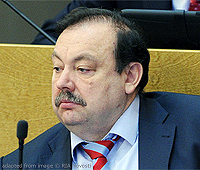Russian Opposition Leaders See Their Name Recognition, Disapproval Ratings Go Up

Interfax – Moscow, 24 September: In the past six months, most leaders of the unofficial opposition have managed to increase their name recognition, but their approval ratings have remained the same, while their rejection levels have gone up, according to the results of polls that became available to Interfax.
The growth of Russian opposition leaders’ name recognition is especially noticeable in the case of the author of the RosPil anti-corruption project, Aleksey Navalnyy, and former State Duma member Gennadiy Gudkov.
According to polls by VTsIOM (All-Russian Centre for the Study of Public Opinion), Navalnyy was known, to a varying extent, to 29 per cent of Russians in February, but by September, this figure increased to 48 per cent. Respectively, Gudkov’s recognition went up from 21 to 60 per cent.
Among other representatives of the unofficial opposition, there have been higher levels of name recognition for Left Front leader Sergey Udaltsov (from 13 to 39 per cent), the leader of the movement for the defence of the Khimki forest, Yevgeniya Chirikova (from 12 to 20 per cent), and a State Duma member from the party A Just Russia, Ilya Ponomarev (from 14 to 23 per cent).
According the polls, protest movement leaders are best known primarily among residents of the capitals. For example, among those polled in Moscow and St Petersburg, Navalnyy is well known to 40 per cent, while Udaltsov to 33 per cent, whereas in other populated localities no more than 13-15 per cent know about them.
Meanwhile, along with the growth of opposition leaders’ name recognition, negative opinion about them has also increased. In the past six months, the share of those who have a negative view of Navalnyy has increased from 31 to 43 per cent, Gudkov – from 29 to 43 per cent, Udaltsov – from 26 to 42 per cent, Ponomarev – from 28 to 40 per cent, and Chirikova – from 24 to 39 per cent.
The share of those who view them positively remains the same, except for Udaltsov (positive views increased from 18 to 27 per cent) and, partly, Chirikova (from 22 to 28 per cent, respectively), according to the VTsIOM polls, which were conducted on 15-16 September and involved 1,600 people in 138 populated localities in 46 regions, territories and republics of Russia.
